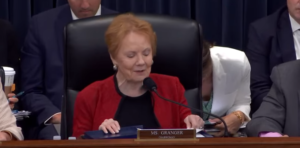Extent of House-Proposed Spending Cuts Begins to Sink In
The House Appropriations Committee has revealed its planned FY2024 spending levels for each of its 12 subcommittees. Although the figures still do not indicate what any specific agency will get, seeing them on paper makes the extent of the proposed cuts palpably evident. The subcommittee that funds NASA, for example, will have almost 30 percent less to spend in FY2024 than FY2023. Only three subcommittees get increases and they are less than inflation.

House Appropriations Committee Chair Kay Granger (R-TX) pointed out that the Fiscal Responsibility Act set a cap on total discretionary spending, “a ceiling, not a floor.”
She vowed to limit total FY2024 appropriations to the FY2022 level as originally proposed by House Republicans before Speaker Kevin McCarthy and President Biden negotiated the Fiscal Responsibility Act and to claw back an additional $115 billion in “unnecessary, partisan programs.”
“Because of years of out-of-control spending, it has been and will continue to be my priority to pass conservative bills that focus our limited resources on the core responsibilities of the federal government, including national defense, our veterans, and our border.
“The Fiscal Responsibility Act set a topline spending cap – a ceiling, not a floor – for Fiscal Year 2024 bills. That is why I will use this opportunity to mark up appropriations bills that limit new spending to the Fiscal Year 2022 topline level. In addition, by clawing back $115 billion in unnecessary, partisan programs, we will re-focus government spending consistent with Republican priorities, keeping total spending 1% lower than if we were operating under a continuing resolution. ” — Rep. Kay Granger
Each subcommittee is given a fixed amount of money — an “allocation” — to spend. The subcommittee members decide how to divvy it up among the departments and agencies under their jurisidiction. Roll Call published a table showing how much each of them are getting. The three subcommittees with the most direct involvement in space activities are Defense, Commerce-Justice-Science (NASA and NOAA), and Transportation-HUD (FAA).

Update: The committee formally adopted the subcommittee allocations on June 15 after a rancorous 2-day discussion. The party-line vote was 33-27. The Roll Call figures are for discretionary budget authority.
The total available to the CJS subcommittee that funds the Department of Commerce including NOAA, the Department of Justice, the National Science Foundation, NASA and others will have 28.8 percent less to spend for FY2024 than what they appropriated for FY2023. THUD will have 25.3 percent less. Other subcommittees are hit even harder. Interior-Environment, which funds the U.S. Geological Survey, will have 34.6 percent less. USGS operates the Landsat satellites. The biggest cut is to Financial Services-General Government, which includes the FCC, with 59 percent less.
Only Defense, Homeland Security and Military Construction-Veterans Affairs (MilCon-VA) get increases — 3.6 percent, 3.4 percent and 1.0 percent respectively, none of which keep pace with inflation.
The figures do not reflect the $115 billion in clawbacks Granger mentioned, where Congress takes back money it previously approved. How that might affect past or future funding for space programs is unknown at this time.

The top Democrat on the Appropriations Committee, Rep. Rosa DeLauro (D-CT), bitterly complained today that Granger released the subcommittee allocations to the press before sharing them with everyone on the committee and did it just hours before marking up the MilCon-VA bill this morning.
Acknowledging that the Fiscal Responsbility Act is the law of the land and must be followed, she asserted Republicans aren’t doing that, but going much further.
“The dust has only just settled after a brutal fight over the debt limit. The ink of the President’s signature is hardly dry. It is no secret that I am no fan of where we ended up, but we have a path to funding the United States Government on time. We ought to take that path.
“When I was chair, I made sure everyone learned subcommittee allocations from me – not the press – out of respect for my colleagues and this institution.
“Asking us to vote on this bill hours after we learned the full slate of cuts is disingenuous and is fooling no one. Not to mention, this exchange of information hours after it was given to the press and right before we head into the first full committee markup is a massive departure from how we treat Republicans when we have the pen.
“These allocations show that House Republicans are doubling down on the Default on America Act’s $142 billion in cuts. But they don’t want to stop there. Reports indicate they want to go up to $159 billion in cuts, but, our initial review of their proposal suggests they may go as high as $189 billion! Where will their desire for drastic cuts end!?
“With the toplines released last night, Republicans are flouting the law of the land. They are disregarding the letter and spirit of the agreement between the President and the Speaker of the House.” — Rep. Rosa DeLauro
NASA Administrator Bill Nelson wrote to DeLauro earlier this year outlining the impact of a 22 percent cut, something seen as a possibility at the time. He called it “devastating and potentially unrecoverable.”
This is just the opening salvo in the FY2024 appropriations process, but is effective in signalling the expectations of the House Republican leadership. Whether the majority of House Republicans agrees won’t be known until the bills are debated on the floor of the House, and agreement still will have to be reached with the Senate. There’s a long way to go, but as Deputy Administrator Pam Melroy said last week, the chances of NASA getting all the money requested for FY2024 is “unlikely.”
User Comments
SpacePolicyOnline.com has the right (but not the obligation) to monitor the comments and to remove any materials it deems inappropriate. We do not post comments that include links to other websites since we have no control over that content nor can we verify the security of such links.